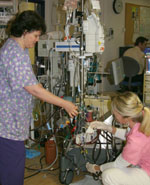ECMO offers services to peds, adult
patients
by
Maggie Diebolt Public Relations
Having saved hundreds of babies’ lives, extracorporeal membrane oxygenation (ECMO) also is used to save pediatric and adult patients by allowing the heart and lungs to rest and recover from serious disease.
 Registered nurses
Sheryl Bey, left, and Leslie von Lehe conduct a routine check of the
ECMO circuit.
Registered nurses
Sheryl Bey, left, and Leslie von Lehe conduct a routine check of the
ECMO circuit. It takes 24 specialists, two medical directors, one team coordinator and one nurse manager to maintain the fully-functional ECMO program at MUSC. It is the only ECMO program in the state to offer its services to pediatric and adult patients, as well as neonates, and is one of only 78 international centers.
ECMO, known as extracorporeal life support, is used in patients who have a disease that prevents their lungs or heart from working properly. The ECMO machine functions by allowing a patient’s blood to flow outside of their body and back into their heart, doing the work of the heart and lungs while allowing them to rest and recover.
Dilip Purohit, M.D., medical director for ECMO, has overseen the development and growth of the ECMO program since it started in the Neonatal Intensive Care Unit in 1988. The program has treated 298 patients—of whom 194 were neonates, 82 were pediatric patients and 22 were adults—during the last 19 years.
“ECMO is provided wherever it is needed, whether it is in the NICU, the Pediatric Intensive Care Unit, or other adult intensive care units. The role of the specialist is so diverse because you have neonatal, pediatric, adult nurses and respiratory therapists crossing over between their units when their services are needed,” said Stacey Laws, ECMO coordinator.
Patients on ECMO are supervised 24- hours-a-day by an ECMO specialist. “Coordinating a team of ECMO specialists between units is a collaborative process,” Laws said.
MUSC is able to care for up to three ECMO cases at a time. “For three ECMO machines to be used continually, with one as a backup, six people a day are needed to work in 12-hour shifts in order to be on hand for 24 hours,” Laws said. ECMO specialists undergo intensive training during a six-week class that consists of 32 didactic hours and 36 clinical hours.
During the ongoing ECMO process, venous blood is drained through a tube and is pumped through the ECMO circuit into an oxygenator. The blood is dark since it contains little oxygen, but after going through the oxygenator, which acts as an artificial lung, it is cleared of carbon dioxide and turns a bright red after absorbing oxygen. The blood is then warmed in a heat exchanger and is returned to the patient.
While the neonatal ECMO program was being established, Joel Cochran, D.O., set about creating a formalized pediatric program 12 years ago, and then an adult program five years later.
“A person can be on ECMO for a period of days to more than a month, to try and buy the patient time to recover from the process that made them sick,” Cochran said, “and so the lung and the heart can recover to support themselves.”
For patients to be put on ECMO, they must meet certain criteria, which typically involves either their heart or their lungs not working or responding to conventional therapy. “We offer ECMO to patients when other modes of therapy have failed and they are unlikely to survive without it,” Cochran said.
Clinical trials have proven the efficacy of ECMO use in neonatal patients. Of the neonatal patients placed on ECMO, approximately 80 percent of them will survive. The percentage rate of survival for pediatric or adult patients is not as high since their medical problems are more complicated and more difficult to diagnose and treat. Still, about 60 percent to 65 percent of pediatric patients survive with the help of ECMO.
“A lot of people in South Carolina don’t realize that, essentially in a pediatric perspective, you don’t have to go anywhere else—to another university or hospital—for care. ECMO is a state-of-the-art tool,” Cochran said. “We’re fortunate for the support of the administration, nursing staff, ECMO specialists, pediatric surgeons, cardiothoracic surgeons, cardiologists, perfusionists, and a multitude of other specialties whose expertise is called for in individual cases. It can be an amazing lifesaving treatment in a certain patient population that would not be offered in other parts of the nation. That makes MUSC unique.”
Friday, April 13, 2007
Catalyst Online is published weekly,
updated
as needed and improved from time to time by the MUSC Office of Public
Relations
for the faculty, employees and students of the Medical University of
South
Carolina. Catalyst Online editor, Kim Draughn, can be reached at
792-4107
or by email, catalyst@musc.edu. Editorial copy can be submitted to
Catalyst
Online and to The Catalyst in print by fax, 792-6723, or by email to
catalyst@musc.edu. To place an ad in The Catalyst hardcopy, call Island
Publications at 849-1778, ext. 201.